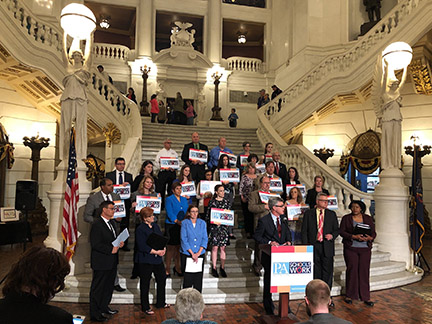PA Schools Work Launches into Action; Demands Education Funding Increases in the #PABudget
June 6, 2018
Paul Healey, Ph.D., PA Principals Association executive director, and Dr. Joseph Clapper, PA Principals Association assistant executive director, joined other education leaders at a rally held today at the Capitol Rotunda in Harrisburg to demand funding increases in the PA State Budget. The rally was sponsored by PA Schools Work.
PA Schools Work is a non-partisan grassroots campaign calling on the state to pay its fair share and adequately and equitably fund public education so that all Pennsylvania students can attend public schools that will ensure they graduate with the 21st-century skills necessary for success in college or a career.
Its first order of business: urging that the General Assembly, at a minimum, increase funding for basic education by $100 million, special education by $20 million, and the career and technical education subsidy by $10 million in the 2018-19 state budget.
- Pennsylvania schools work – for students, communities and the economy – when they have the resources to give all students an equal opportunity to attend a local public school that has adequate resources to ensure that he or she can learn and meet state academic standards.
- But Pennsylvania is not delivering for its students.
- Pennsylvania ranks 47th in the country in the state’s share of funding for public schools, leaving local taxpayers to bear a higher burden of education costs.
- It has one of the widest gaps between the highest and lowest spending school districts of any state in the country, meaning that the educational opportunities available to a student depends largely on where that student lives.
- Lawmakers must recognize that if the state is to fund all schools adequately and eliminate funding disparities across school districts, the state must significantly increase its investment in public schools.
- A student’s classroom experience is affected not only by funding coming through the basic education line item in the state budget, but also by special education funding for students with disabilities and the state subsidy for career and technical education that gives students practical, tangible skills they need to be prepared for future education and work.
- Special education services have risen by more than $1.6 billion over the last decade and state funding has not kept pace. As a result, the state share of support for special education declined from more than 36 percent of the cost incurred by school districts to less than 25 percent of actual costs.
- The same trends exist for career and technical education. The state subsidy to support Career and Technical Education (CTE) has fallen to less than eight percent of CTE costs after eight years of stagnant funding. At a time when more Pennsylvania employers say it is hard to find qualified workers, the state must do more.
- That is why PA Schools Work is being launched: to carry the message that Pennsylvania must begin paying its fair share so all students’ classroom needs.
- We are calling on the state to fund public education equitably and adequately so that all Pennsylvania students, regardless of race, ethnicity, ability, family income or the community where they live, can attend public schools that will ensure they graduate with the 21st-century skills necessary for success in college or a career.
- To achieve that goal, the state must pay its fair share for public education by
- The state must generate the necessary revenues through sustainable, recurring funding sources to support adequate and equitable funding in these areas, while delivering targeted property tax relief to those who need it.
- The need is more imperative than ever before, with 429 of Pennsylvania’s 500 school districts not getting their fair share from the state and 227 districts forced to spend less than what is needed to educate their students.
- These goals will not be reached immediately, but the state must start taking action right away.
-
- Increasing basic education funding by at least $3 billion through the state’s fair funding formula
- Ensuring all special education students get the high-quality, inclusive services they need and deserve by increasing, over the next five years, the state’s share of special education funding up to 35 percent of special education costs
- Ensuring that funding for CTE is adequate and equitably distributed so that every student who chooses to pursue CTE can get learning opportunities that allow them to progress towards an industry-based credential in their chosen career.

